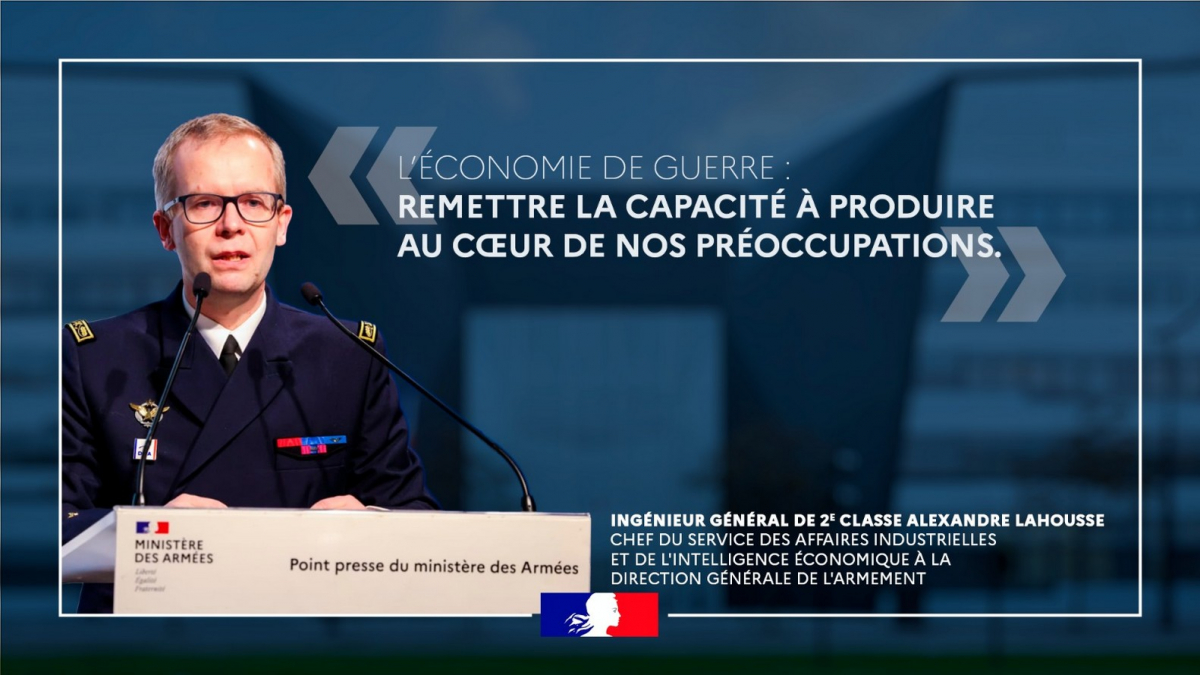At the weekly press briefing of the Ministry of the Armed Forces, the head of the DGA's industrial affairs and economic intelligence department presented an initial assessment of the actions carried out to promote the war economy. Alexandre Lahousse unveiled the five projects underway to accelerate production rates.
A consequence and a lesson of the conflict in Ukraine
The " war economy " actions must be understood as a consequence and a lesson of the conflict in Ukraine. As prescribed in the National Strategic Review 2022, presented by President Macron last November, it is now essential that the industrial tool be organized " to support a war effort over time, in case of necessity for the armed forces or for the benefit of a partner ". Weapon system production, ammunition and sustainment capabilities must therefore evolve to meet the needs of a potential engagement in a major conflict. To carry out this sprawling undertaking, the French Directorate General of Armaments (DGA), in conjunction with the other entities of the French Ministry of the Armed Forces and industrialists, has tackled five priority projects.
1st action : 7-year visibility for industrialists
" The goal is for industry to be able to invest in the long term on its production tool," says Alexandre Lahousse, the head of the DGA's industrial affairs and economic intelligence department. As such, the future military programming law (2024-2030) will offer industrialists of the defense industrial and technological base (DITB a seven-year visibility. Long-term contracts covering a list of equipment that is essential in the event of a high-intensity conflict are part of this approach. Alexandre Lahousse also points to the need to "share and trickle down this visibility " between all actors in the production chain, including subcontracting SMEs in order to jointly scale up.
2nd action : simplification
" What is simple is produced better ", reminds Alexandre Lahousse. The objective is therefore to start this simplification from the expression of the need and to perform upstream, with manufacturers, armies and DGA a " value analysis ". The latter consists of reviewing the requirements, putting a figure on them and assessing the impact in terms of time and cost. The objective is " to reduce the level of requirement by 20% in order to simplify the work of the industrialist," estimates Alexandre Lahousse. These provisions lead, de facto, fewer justifications and subject " a sharing of risk between the state and the industry."
3rd action : securing supply chains
Supply and subcontracting chain lead times now account for more than 50% of overall production lead times. " The battle of lead times is therefore won in the mastery of subcontracting chains ", souls Alexandre Lahousse. In this regard, 4% of the 4 000 companies in the DITB would not be able to accelerate production and are in fact bottlenecks. They will therefore be the subject of studies so that appropriate responses can be found. Several levers are also being studied to limit foreign dependence. Among them, the constitution of contingency stocks, particularly on raw materials, or the multiplication of foreign sources of supply when they are unique and, if this is not possible, the relocation of the activities concerned in France.
4th action : recruitment
The attractiveness of the defense industry is essential to put" people behind the machines ", insists Alexandre Lahousse. The focus will therefore be on communication with the younger generation as well as on critical skills. For example, the professions of welder or mechanical fitter are in high demand by manufacturers. A dialogue with companies, training schools and the Ministry of National Education will be initiated on this subject.
5th action : financing
" The founding model of a company is to be able to raise funds to invest ", notes Alexandre Lahousse." It is therefore essential for us to ensure access to private financing for DTIB companies ", he adds. With this in mind, the French Ministry of the Armed Forces has been working for the past year to set up a network of banking referents to better dialogue with banking institutions. In parallel, several initiatives are underway to promote investment in the defense sectors, including at the European level.
Découvrez cet article sur Air&Cosmos

